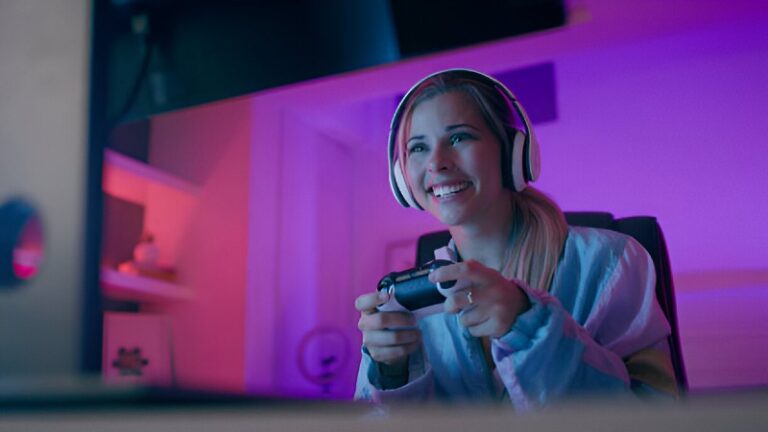Forget the old stereotypes. In our fast-paced world, gaming’s mental health boost is emerging as a powerful, under-recognized force for well-being. It’s not just about escapism; it’s about actively cultivating resilience, sharpening cognitive skills, and fostering genuine human connection. This fresh look explores how strategic play can be a deliberate tool for a healthier, more robust mind.
The Science of Inner Strength
Recent studies, including groundbreaking research from Oxford, are mapping out the precise ways games impact our psychology. They’ve identified over a dozen mechanisms where gameplay directly influences mental states. This isn’t just correlation; it’s a deep dive into how interactive experiences can build lasting mental fortitude.
- Emotional Gym: Games are safe arenas to practice emotional regulation. Frustration, triumph, and collaboration all demand a measured response, training your brain to handle real-world emotional ups and downs more effectively.
- Brain Boost: Fast-paced challenges and complex puzzles directly enhance executive functions, memory, and attention. It’s like a workout for your brain, building stamina for daily life’s demands.
- Empowerment in Play: The agency you feel in a game – making choices and seeing immediate results – can counteract feelings of helplessness often associated with stress. This sense of control builds crucial self-belief.
Mindful Gaming Habits
To truly harness gaming’s mental health boost, intentionality is key. It’s about being present and using games as a positive force, not just a time sink.
| Mindful Gaming Practice | Why It Matters for Mental Health |
| Play with Purpose | Shifts from mindless habit to targeted stress relief or skill-building. |
| Timely Breaks | Prevents overload, maintains focus, and keeps you connected to your physical world. |
| Self-Check-Ins | Helps you understand why you’re playing and ensures it’s genuinely beneficial. |
| Variety in Games | Engages different parts of your brain and prevents dependency on one type of experience. |
The Science of Positive Play
Recent groundbreaking research, including an extensive Oxford study, has meticulously mapped out the complex relationship between gaming and psychological well-being. This work identifies over a dozen distinct mechanisms through which games can influence mental states, moving beyond simple correlation to pinpoint causal links. It’s clear that the impact of gaming goes far deeper than just passing the time.
- Emotional Resilience Lab: Games are low-stakes environments where you can practice navigating a spectrum of emotions. From the frustration of a tough boss battle to the elation of overcoming a complex puzzle, these experiences train your emotional regulation skills, helping you better handle similar challenges in daily life.
- Cognitive Agility Training: Many games, especially strategy and action titles, demand quick thinking, problem-solving, and precise decision-making. This consistent mental workout sharpens your executive functions, working memory, and attention span, improving your brain’s overall efficiency.
- A Sense of Control: In games, you often have clear objectives and immediate feedback on your actions, which can foster a strong sense of autonomy and accomplishment. This feeling of agency, particularly potent when real-world circumstances feel overwhelming, can significantly boost self-esteem and reduce feelings of helplessness.
Embracing Gaming’s Potential
The evidence is clear: gaming’s mental health boost is a genuine and increasingly recognized phenomenon. As our understanding of the human mind and digital interaction continues to evolve, so too will the ways in which games can be leveraged for therapeutic and developmental purposes. From fostering cognitive resilience and emotional regulation to building vital social connections and even promoting physical activity, gaming offers a dynamic and engaging pathway to improved mental well-being. By embracing mindful engagement and recognizing its diverse benefits, we can unlock the full potential of gaming to contribute positively to a healthier and happier world.
Social and Therapeutic Frontiers
The benefits of gaming stretch far beyond your individual screen. Multiplayer experiences, when nurtured, create vibrant communities and combat loneliness. For many, these online spaces offer a low-pressure environment to build friendships and find support, which can be invaluable for those who find face-to-face interactions challenging.
Moreover, the field of therapeutic gaming is exploding. Specialized games and VR experiences are now being used to aid in trauma recovery, improve cognitive function, and teach coping mechanisms for various mental health conditions. Imagine games prescribed by therapists as part of a treatment plan – that future is already here, highlighting a profound shift in how we view digital play.
Conclusion
It’s time to re-evaluate what we know about gaming. Gaming’s mental health boost isn’t a myth; it’s a scientifically supported reality with immense potential. By adopting mindful practices, recognizing the deep psychological benefits, and embracing its therapeutic applications, we can unlock a powerful new ally in our pursuit of mental well-being.
Frequently Asked Questions (FAQs)
Can video games genuinely improve mental health?
Yes, recent research indicates that video games can genuinely improve mental health by fostering emotional regulation, cognitive skills, and social connections when engaged with mindfully.
What specific cognitive benefits can gaming provide?
Gaming can enhance cognitive functions such as problem-solving skills, executive functions, working memory, and attention span.
How does gaming help with emotional resilience?
Games provide a safe environment to practice emotional regulation, navigate challenges, and build a sense of accomplishment, which translates to greater emotional resilience in real life.
Is social interaction through gaming beneficial for mental health?
Absolutely. Multiplayer games can foster strong communities, reduce feelings of isolation, and help individuals build social skills in a low-pressure environment.
What is therapeutic gaming?
Therapeutic gaming involves using specially designed or adapted games as tools to support mental health treatments, aiding in skill development, emotional processing, and cognitive improvement.
Can gaming be addictive, and how can I ensure it’s a positive influence?
While excessive gaming can be an issue, practicing mindful gaming habits like setting intentions, taking breaks, and self-checking can ensure it remains a positive influence on your mental health.
How do games offer a sense of control and why is it important for mental well-being?
Games often give players clear objectives and immediate feedback, fostering a strong sense of autonomy and accomplishment. This feeling of control is crucial for boosting self-esteem and reducing feelings of helplessness.
Are all types of games beneficial for mental health?
Different game genres offer various benefits. Engaging with a diverse range of games can provide varied cognitive and emotional stimulation, contributing to overall mental well-being.


